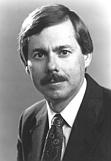William D. Young
For his engineering skills and technical leadership in establishing the process engineering and manufacturing foundations of the recombinant-DNA-based biotechnology industry, the Schools of Engineering are proud to present the Distinguished Engineering Alumnus Award to William D. Young.
Senior Vice President
Genentech Inc.
BSChE 1966

On Purdue
Purdue was a very big and complex place for a freshman. Even in those days there were 20,000 students. I was used to high school classes with 30, but the basic engineering classes had 200. I did develop good friends, but at first they were random, based on who my roommates were. I knew about the fraternity system, and I ended up as a Triangle. That broke the size problem down a bit. My frat brothers were all engineers, too. The closest friends I ever had and still have were my fraternity brothers, even though I don't see them often.
The objective of the basic engineering classes was to weed out incoming freshmen, to find out who was really serious. But there was a young professor, Charlie Wales, who really impressed me because he was very interested in us as people. He taught a basic chemical engineering course the semester Kennedy was assassinated. I remember that day-we all stood with him out on the steps of the building, talking a bout what had happened. We really didn't feel much like class.
On his career
My career has turned out a lot differently than I envisioned. In those days in chemical engineering you were trained as a petroleum engineer-biotechnology didn't even exist in its current form. So I interviewed with oil companies and big chemical companies. One day I was wandering by the placement office and saw a recruiter from Eli Lilly. I stopped and I talked to him, and that got me really interested in Lilly, where I eventually got my first job. It wasn't planned that way. It was all a fluke, really.
My first few years at Lilly were spent working with Lilly's first chemical engineer, Sam McCormick (also a Purdue grad), who was a mentor to many young engineers over the years. Sam was a key part of commercializing penicillin production after World War II, and he taught me a tremendous amount.
I had a lot of great jobs at Lilly, even though I never kept one for more than one or two years, it seemed. I got involved serendipitously with new projects Lilly was doing, and I had different kinds of assignments, such as process development and engineering. Then I spent five years in Puerto Rico building a plant and running it. When biotechnology came around, I was ready for it.
My greatest accomplishments have been related to Genentech. What we've built here is really special. I feel like I've been a key part of building an organization, a culture, and a company that have generated many products that have helped people. My role has been putting an organization in place that takes products from research scientists, makes them relevant, and delivers them to patients.
On teams and leadership
Our industry faces a major academic challenge regarding the preparation of engineers. It's difficult to find trained engineers and scientists who can work in biotechnology-the ultimate multidisciplinary field. Standard chemical engineering education doesn't give much credit to the delicacy and intricacy of our industry and the large, complex molecules we work with. Also, there's more emphasis now on engineers who can relate and work with others. The stereotype of the engineer is a dull, social outcast who likes to work with things, but that kind of person can't work in the modern industrial environment. Engineers need leadership and interaction skills. Engineering students should get a broad base that enhances their skills in relating to other people and accomplishing a task in a team environment, because that's what they'll be doing after college. Lone contributors are few. They exist, and sometimes the value of what they contribute is so high that you tolerate everything else about them. But almost everyone needs to work with others and contribute within a team environment.
- 1988:
- Senior vice president, Genentech. Responsible for bringing Genentech's products from the research stage to commercial manufacture. Has functional responsibility for process sciences, manufacturing, quality, engineering, and regulatory affairs.
- 1984:
- Vice president, manufacturing and process sciences.
- 1980:
- Joined Genentech as director of manufacturing and process development.
- 1979:
- Manager of Human Insulin Process Development and Manufacturing project. Responsible for process development, plant design, and construction of the plant, which synthesized human insulin-the world's first product to be produced from recombinant DNA technology.
- 1975:
- Manager of Lilly biochemical operations in San Juan, Puerto Rico. Oversaw engineering, design, construction, start-up, and operation of the new fermentation plant.
- 1973:
- Head of the Antibiotic Fermentation Department. Helped design and build fermentation plants in the U.S. and U.K.
- 1972:
- Operations coordinator for Antibiotic Development Purification Pilot Plant.
- 1970:
- Senior process engineer at Clinton, Indiana, plant.
- 1969:
- Project engineer.
- 1966:
- Staff engineer for Eli Lilly & Co., Indianapolis.
BSChE 1966, Purdue; MBA 1971, Indiana University.
